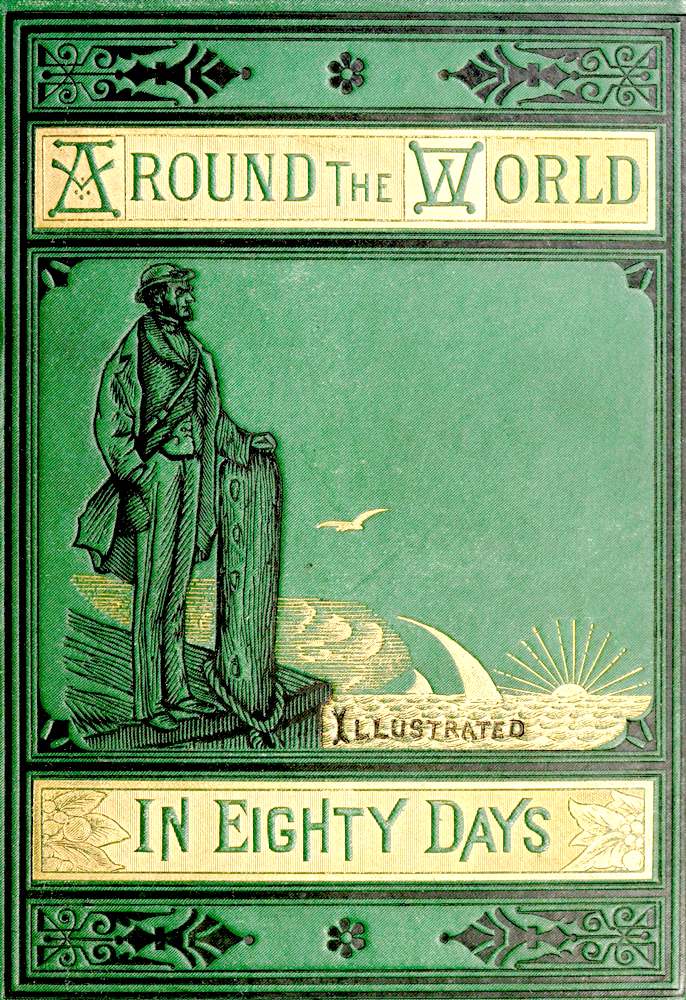|
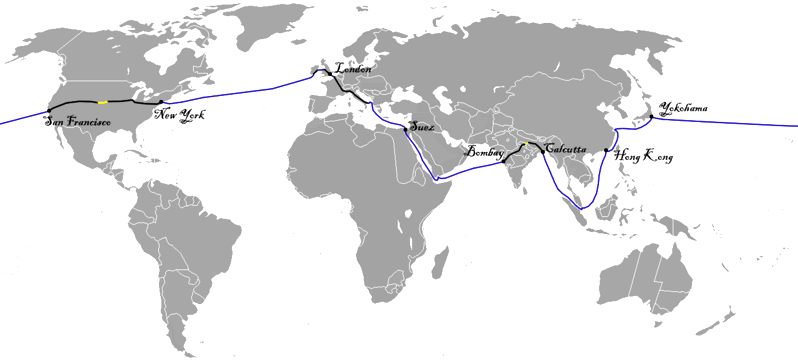
Map
of the route taken by Phileas Fogg, starting in London, then proceeding
east to Suez, Bombay, Calcutta, Hong Kong , Yokohama, San Francisco, New
York, and across the Atlantic
ocean to Ireland, then Liverpool England, and back to London. The route
planner below is for a circumnavigation on water in under 80 days, using
hydrogen, as per the author's prediction in The Mysterious Island. It
would be a major achievement if this was arranged to honor the 150th
anniversary of his publication.
CHAPTER
XV.
IN WHICH THE BAG OF BANKNOTES DISGORGES SOME THOUSANDS OF POUNDS MORE
The train entered the station, and Passepartout jumping out first, was followed by Mr. Fogg, who assisted his fair companion to descend. Phileas Fogg intended to proceed at once to the Hong Kong steamer, in order to get Aouda comfortably settled for the voyage. He was unwilling to leave her while they were still on dangerous ground.
Just as he was leaving the station a policeman came up to him, and said, “Mr. Phileas Fogg?”
“I am he.”
“Is this man your servant?” added the policeman, pointing to Passepartout.
“Yes.”
“Be so good, both of you, as to follow me.”
Mr. Fogg betrayed no surprise whatever. The policeman was a representative of the law, and law is sacred to an Englishman. Passepartout tried to reason about the matter, but the policeman tapped him with his stick, and Mr. Fogg made him a signal to obey.
“May this young lady go with us?” asked he.
“She may,” replied the policeman.
Mr. Fogg, Aouda, and Passepartout were conducted to a palkigahri, a sort of four-wheeled carriage, drawn by two horses, in which they took their places and were driven away. No one spoke during the twenty minutes which elapsed before they reached their destination. They first passed through the “black town,” with its narrow streets, its miserable, dirty huts, and squalid population; then through the “European town,” which presented a relief in its bright brick mansions, shaded by coconut-trees and bristling with masts, where, although it was early morning, elegantly dressed horsemen and handsome equipages were passing back and forth.
The carriage stopped before a modest-looking house, which, however, did not have the appearance of a private mansion. The policeman having requested his prisoners—for so, truly, they might be called—to descend, conducted them into a room with barred windows, and said: “You will appear before Judge Obadiah at half-past eight.”
He then retired, and closed the door.
“Why, we are prisoners!” exclaimed Passepartout, falling into a chair.
Aouda, with an emotion she tried to conceal, said to Mr. Fogg: “Sir, you must leave me to my fate! It is on my account that you receive this treatment, it is for having saved me!”
Phileas Fogg contented himself with saying that it was impossible. It was quite unlikely that he should be arrested for preventing a suttee. The complainants would not dare present themselves with such a charge. There was some mistake. Moreover, he would not, in any event, abandon Aouda, but would escort her to Hong Kong.
“But the steamer leaves at noon!” observed Passepartout, nervously.
“We shall be on board by noon,” replied his master, placidly.
It was said so positively that Passepartout could not help muttering to himself, “Parbleu that’s certain! Before noon we shall be on board.” But he was by no means reassured.
At half-past eight the door opened, the policeman appeared, and, requesting them to follow him, led the way to an adjoining hall. It was evidently a court-room, and a crowd of Europeans and natives already occupied the rear of the apartment.
Mr. Fogg and his two companions took their places on a bench opposite the desks of the magistrate and his clerk. Immediately after, Judge Obadiah, a fat, round man, followed by the clerk, entered. He proceeded to take down a wig which was hanging on a nail, and put it hurriedly on his head.
“The first case,” said he. Then, putting his hand to his head, he exclaimed, “Heh! This is not my wig!”
“No, your worship,” returned the clerk, “it is mine.”
“My dear Mr. Oysterpuff, how can a judge give a wise sentence in a clerk’s wig?”
The wigs were exchanged.
Passepartout was getting nervous, for the hands on the face of the big clock over the judge seemed to go around with terrible rapidity.
“The first case,” repeated Judge Obadiah.
“Phileas Fogg?” demanded Oysterpuff.
“I am here,” replied Mr. Fogg.
“Passepartout?”
“Present,” responded Passepartout.
“Good,” said the judge. “You have been looked for, prisoners, for two days on the trains from Bombay.”
“But of what are we accused?” asked Passepartout, impatiently.
“You are about to be informed.”
“I am an English subject, sir,” said Mr. Fogg, “and I have the right—”
“Have you been ill-treated?”
“Not at all.”
“Very well; let the complainants come in.”
A door was swung open by order of the judge, and three Indian priests entered.
“That’s it,” muttered Passepartout; “these are the rogues who were going to burn our young lady.”
The priests took their places in front of the judge, and the clerk proceeded to read in a loud voice a complaint of sacrilege against Phileas Fogg and his servant, who were accused of having violated a place held consecrated by the Brahmin religion.
“You hear the charge?” asked the judge.
“Yes, sir,” replied Mr. Fogg, consulting his watch, “and I admit it.”
“You admit it?”
“I admit it, and I wish to hear these priests admit, in their turn, what they were going to do at the pagoda of Pillaji.”
The priests looked at each other; they did not seem to understand what was said.
“Yes,” cried Passepartout, warmly; “at the pagoda of Pillaji, where they were on the point of burning their victim.”
The judge stared with astonishment, and the priests were stupefied.
“What victim?” said Judge Obadiah. “Burn whom? In Bombay itself?”
“Bombay?” cried Passepartout.
“Certainly. We are not talking of the pagoda of Pillaji, but of the pagoda of Malabar Hill, at Bombay.”
“And as a proof,” added the clerk, “here are the desecrator’s very shoes, which he left behind him.”
Whereupon he placed a pair of shoes on his desk.
“My shoes!” cried Passepartout, in his surprise permitting this imprudent exclamation to escape him.
The confusion of master and man, who had quite forgotten the affair at Bombay, for which they were now detained at Calcutta, may be imagined.
Fix the detective, had foreseen the advantage which Passepartout’s escapade gave him, and, delaying his departure for twelve hours, had consulted the priests of Malabar Hill. Knowing that the English authorities dealt very severely with this kind of misdemeanour, he promised them a goodly sum in damages, and sent them forward to Calcutta by the next train. Owing to the delay caused by the rescue of the young widow, Fix and the priests reached the Indian capital before Mr. Fogg and his servant, the magistrates having been already warned by a dispatch to arrest them should they arrive. Fix’s disappointment when he learned that Phileas Fogg had not made his appearance in Calcutta may be imagined. He made up his mind that the robber had stopped somewhere on the route and taken refuge in the southern provinces. For twenty-four hours Fix watched the station with feverish anxiety; at last he was rewarded by seeing Mr. Fogg and Passepartout arrive, accompanied by a young woman, whose presence he was wholly at a loss to explain. He hastened for a policeman; and this was how the party came to be arrested and brought before Judge Obadiah.
Had Passepartout been a little less preoccupied, he would have espied the detective ensconced in a corner of the court-room, watching the proceedings with an interest easily understood; for the warrant had failed to reach him at Calcutta, as it had done at Bombay and Suez.
Judge Obadiah had unfortunately caught Passepartout’s rash exclamation, which the poor fellow would have given the world to recall.
“The facts are admitted?” asked the judge.
“Admitted,” replied Mr. Fogg, coldly.
“Inasmuch,” resumed the judge, “as the English law protects equally and sternly the religions of the Indian people, and as the man Passepartout has admitted that he violated the sacred pagoda of Malabar Hill, at Bombay, on the 20th of October, I condemn the said Passepartout to imprisonment for fifteen days and a fine of three hundred pounds.”
“Three hundred pounds!” cried Passepartout, startled at the largeness of the sum.
“Silence!” shouted the constable.
“And inasmuch,” continued the judge, “as it is not proved that the act was not done by the connivance of the master with the servant, and as the master in any case must be held responsible for the acts of his paid servant, I condemn Phileas Fogg to a week’s imprisonment and a fine of one hundred and fifty pounds.”
Fix rubbed his hands softly with satisfaction; if Phileas Fogg could be detained in Calcutta a week, it would be more than time for the warrant to arrive. Passepartout was stupefied. This sentence ruined his master. A wager of twenty thousand pounds lost, because he, like a precious fool, had gone into that abominable pagoda!
Phileas Fogg, as self-composed as if the judgment did not in the least concern him, did not even lift his eyebrows while it was being pronounced. Just as the clerk was calling the next case, he rose, and said, “I offer bail.”
“You have that right,” returned the judge.
Fix’s blood ran cold, but he resumed his composure when he heard the judge announce that the bail required for each prisoner would be one thousand pounds.
“I will pay it at once,” said Mr. Fogg, taking a roll of bank-bills from the carpet-bag, which Passepartout had by him, and placing them on the clerk’s desk.
“This sum will be restored to you upon your release from prison,” said the judge. “Meanwhile, you are liberated on bail.”
“Come!” said Phileas Fogg to his servant.
“But let them at least give me back my shoes!” cried Passepartout angrily.
“Ah, these are pretty dear shoes!” he muttered, as they were handed to him. “More than a thousand pounds apiece; besides, they pinch my feet.”
Mr. Fogg, offering his arm to Aouda, then departed, followed by the crestfallen Passepartout. Fix still nourished hopes that the robber would not, after all, leave the two thousand pounds behind him, but would decide to serve out his week in jail, and issued forth on Mr. Fogg’s traces. That gentleman took a carriage, and the party were soon landed on one of the quays.
The “Rangoon” was moored half a mile off in the harbour, its signal of departure hoisted at the mast-head. Eleven o’clock was striking; Mr. Fogg was an hour in advance of time. Fix saw them leave the carriage and push off in a boat for the steamer, and stamped his feet with disappointment.
“The rascal is off, after all!” he exclaimed. “Two thousand pounds sacrificed! He’s as prodigal as a thief! I’ll follow him to the end of the world if necessary; but, at the rate he is going on, the stolen money will soon be exhausted.”
The detective was not far wrong in making this conjecture. Since leaving London, what with travelling expenses, bribes, the purchase of the elephant, bails, and fines, Mr. Fogg had already spent more than five thousand pounds on the way, and the percentage of the sum recovered from the bank robber promised to the detectives, was rapidly diminishing.
CHAPTERS
1. - I. IN WHICH PHILEAS FOGG AND PASSEPARTOUT ACCEPT EACH OTHER, THE ONE AS
MASTER AND AS MAN
2. - II. IN WHICH PASSEPARTOUT IS CONVINCED THAT HE HAS AT LAST FOUND HIS IDEAL
3. - III. IN WHICH A CONVERSATION TAKES PLACE WHICH SEEMS LIKELY TO COST PHILEAS FOGG DEAR
4. - IV. IN WHICH PHILEAS FOGG ASTOUNDS
PASSEPARTOUT, HIS SERVANT
5. - V. IN WHICH A NEW SPECIES OF FUNDS, UNKNOWN TO THE MONEYED MEN, APPEARS ON ’CHANGE
6. - VI. IN WHICH FIX, THE DETECTIVE, BETRAYS A VERY NATURAL IMPATIENCE
7. - VII. WHICH ONCE MORE DEMONSTRATES THE USELESSNESS OF PASSPORTS AS AIDS TO DETECTIVES
8. - VIII. IN WHICH PASSEPARTOUT TALKS RATHER MORE, PERHAPS, THAN IS PRUDENT
9. - IX. IN WHICH THE RED SEA AND THE INDIAN OCEAN PROVE PROPITIOUS TO THE DESIGNS OF PHILEAS FOGG
10. - X. IN WHICH PASSEPARTOUT IS ONLY TOO GLAD TO GET OFF WITH THE LOSS OF HIS SHOES
11. - XI. IN WHICH PHILEAS FOGG SECURES A CURIOUS MEANS OF CONVEYANCE AT A FABULOUS PRICE
12. - XII. IN WHICH PHILEAS FOGG AND HIS COMPANIONS VENTURE ACROSS THE INDIAN FORESTS, AND WHAT ENSUED
13. - XIII. IN WHICH PASSEPARTOUT RECEIVES A NEW PROOF THAT FORTUNE FAVORS THE BRAVE
14. - XIV. FOGG DESCENDS THE LENGTH OF THE BEAUTIFUL VALLEY OF THE GANGES WITHOUT EVER THINKING OF SEEING IT
15. - XV. IN WHICH THE BAG OF BANKNOTES DISGORGES SOME THOUSANDS OF POUNDS MORE
16. - XVI. IN WHICH FIX DOES NOT SEEM TO UNDERSTAND IN THE LEAST WHAT IS SAID TO HIM
17. - XVII. SHOWING WHAT HAPPENED ON THE VOYAGE FROM SINGAPORE TO HONG KONG
18. - XVIII. IN WHICH PHILEAS FOGG, PASSEPARTOUT, AND FIX GO EACH ABOUT HIS BUSINESS
19. - XIX. IN WHICH PASSEPARTOUT TAKES A TOO GREAT INTEREST IN HIS MASTER, AND WHAT COMES OF IT
20. - XX. IN WHICH FIX COMES FACE TO FACE WITH PHILEAS FOGG
21. - XXI. IN WHICH THE MASTER OF THE “TANKADERE” RUNS GREAT RISK OF LOSING A REWARD OF TWO HUNDRED POUNDS
22. - XXII. PASSEPARTOUT DISCOVERS IT IS CONVENIENT TO HAVE MONEY IN ONE’S POCKET
AT THE ANTIPODES
23. - XXIII. IN WHICH PASSEPARTOUT’S NOSE BECOMES OUTRAGEOUSLY LONG
24. - XXIV. DURING WHICH MR. FOGG AND PARTY CROSS THE PACIFIC OCEAN
25. - XXV. IN WHICH A SLIGHT GLIMPSE IS HAD OF SAN FRANCISCO
26. - XXVI. IN WHICH PHILEAS FOGG AND PARTY TRAVEL BY THE PACIFIC RAILROAD
27. - XXVII. IN WHICH PASSEPARTOUT UNDERGOES, AT A SPEED OF 20 MPH, A COURSE OF MORMON HISTORY
28. - XXVIII. IN WHICH PASSEPARTOUT DOES NOT SUCCEED IN MAKING ANYBODY LISTEN TO REASON
29. - XXIX. IN WHICH CERTAIN INCIDENTS ARE NARRATED WHICH ARE ONLY TO BE MET WITH ON AMERICAN RAILROADS
30. - XXX. IN WHICH PHILEAS FOGG SIMPLY DOES HIS DUTY
31. - XXXI. IN WHICH FIX, THE DETECTIVE, CONSIDERABLY FURTHERS THE INTERESTS OF PHILEAS FOGG
32. - XXXII. IN WHICH PHILEAS FOGG ENGAGES IN A DIRECT STRUGGLE WITH BAD FORTUNE
33. - XXXIII. IN WHICH PHILEAS FOGG SHOWS HIMSELF EQUAL TO THE OCCASION
34. - XXXIV. IN WHICH PHILEAS FOGG AT LAST REACHES LONDON
35. - XXXV. IN WHICH PHILEAS FOGG DOES NOT HAVE TO REPEAT HIS ORDERS TO PASSEPARTOUT TWICE
36. - XXXVI. IN WHICH PHILEAS FOGG’S NAME IS ONCE MORE AT A PREMIUM ON ’CHANGE
37. - XXXVII. PHILEAS FOGG FINDS HE GAINED NOTHING BY HIS TOUR AROUND THE WORLD, UNLESS IT WERE HAPPINESS
PLOT
- AROUND
THE WORLD IN EIGHTY DAYS
The story starts in London on October 2, 1872. Phileas Fogg is a wealthy, solitary, unmarried gentleman with regular habits. The source of his wealth is not known and he lives modestly. He fires his former valet, James Forster, for bringing him shaving
water two degrees too cold. He hires as a replacement
Passepartout, a Frenchman of around 30 years of age.
Later that day in the Reform Club, he gets involved in an argument over an article in
The Daily
Telegraph, stating that with the opening of a new railway section in India, it is now possible to travel around the world in 80 days.
Fogg accepts a wager for £20,000 from his fellow club members, which he will receive if he makes it around the world in 80 days. Accompanied by his manservant
Passepartout, he leaves London by train at 8.45 p.m. on October 2, 1872, and thus is due back at the Reform Club at the same time 80 days later, on December 21.
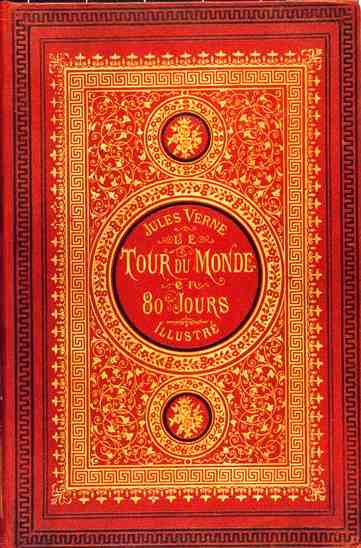
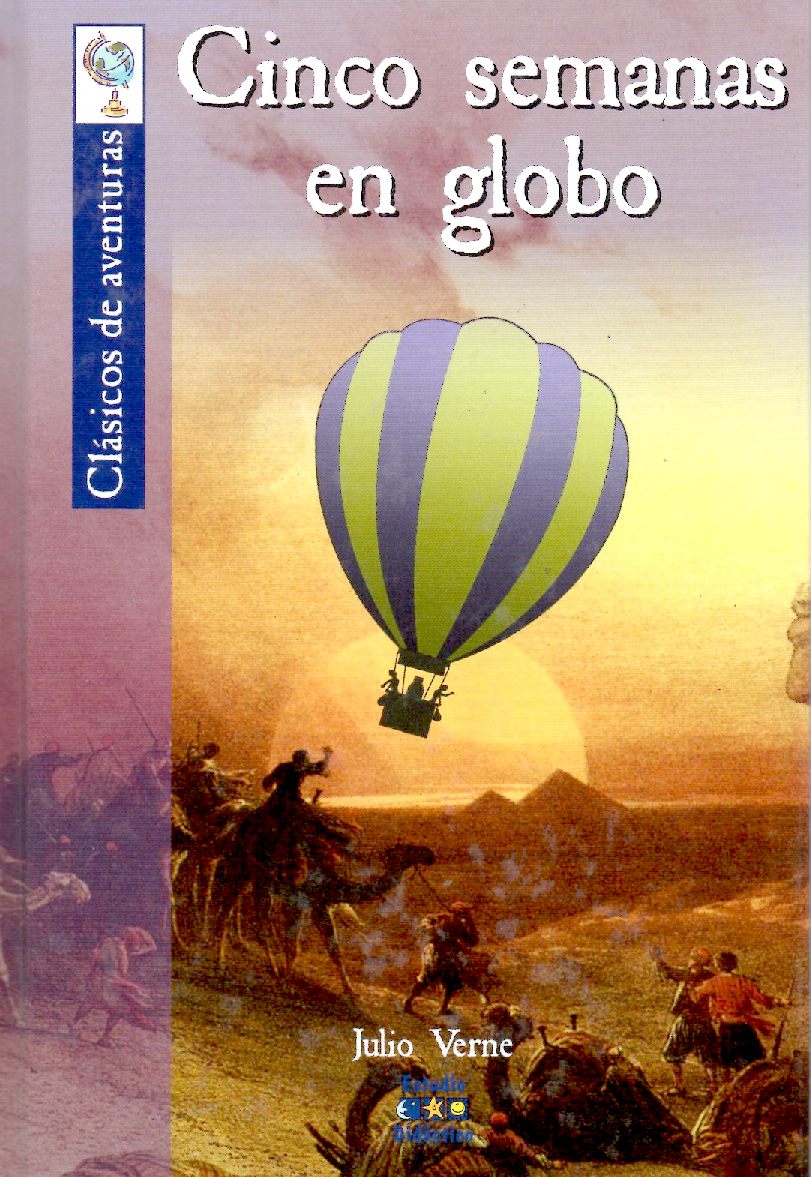
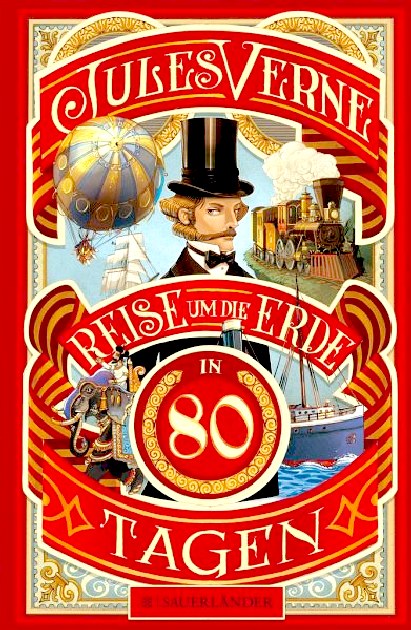
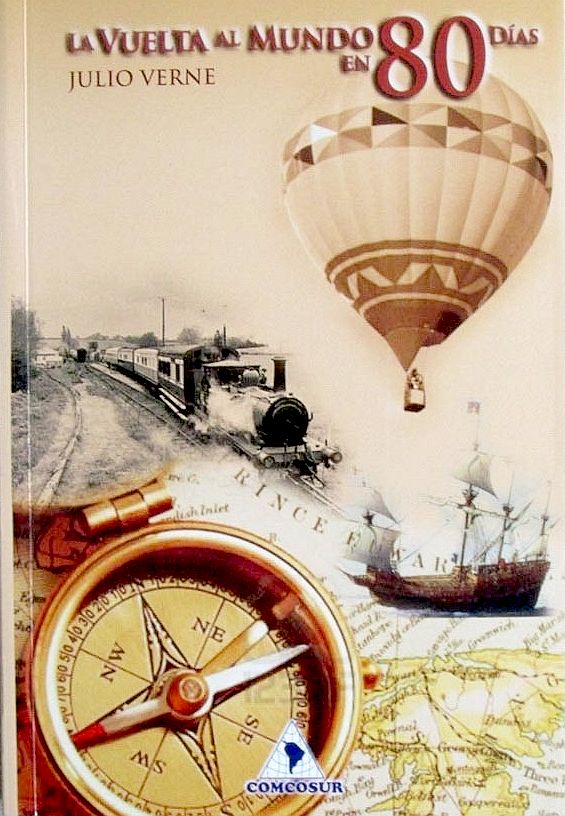

Many
of his stories today seem a little tame, as technology has caught up
with the imagination of the extraordinary French author, and Hollywood
has discovered Computer Generated Images (CGI) allowing super heroes to
grace our screens as never before. Computers are one thing that Verne
did not imagine or seek to portray.
Beginning in late 1872, the serialized version of Verne's famed Around the World in Eighty Days (Le Tour du monde en quatre-vingts jours) first appeared in print. The story of Phileas Fogg and Jean Passepartout takes readers on an adventurous global tour at a time when travel was becoming easier and alluring. In the century plus since its original debut, the work has been adapted for the theater, radio, television and film, including the classic 1956 version starring David
Niven. The TV series starring Pierce Brosnan released in 1989, runs for around 6 hours on
2 DVDs. A BBC
TV travel documentary starring Michael Palin, was also screened in
1989. A second TV series starring David Tennant was produced by the
BBC for 2021.

Jules
Verne is known as the Father of Science Fiction
Where
Jules Verne's suggested that it might be possible to travel Around The
World In 80 Days, we would like to extend that ethos to include
traveling in a Zero
Emission yacht (ZEWT or ZEV) driven by electric
hydro-jets? With the advent of solar power and liquid
hydrogen, it is a distinct possibility - on a scale of the wager
that the legendary Philleas Fogg entered into at the Reform Club in
1872.
|







